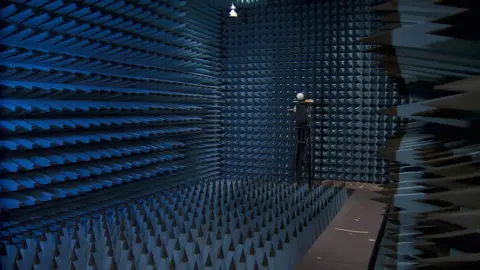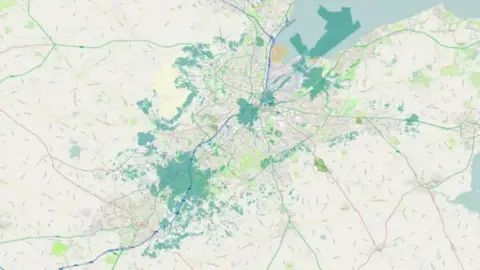Belfast 5G: What faster connectivity will mean for city
 Getty Images
Getty ImagesA major technology upgrade is taking place in Belfast: a brand new 5G service.
EE, the mobile operator, is rolling out the new data connection across UK cities, promising to bring in a "new era".
That new era is said to be one of "more reliable connectivity", bringing 5G to areas like Great Victoria Street.
The question is, however, who that new era of digital advancement will really benefit?
What exactly is 5G?
Put simply, it's the next, or fifth generation, of mobile internet connectivity, which promises much faster data download and upload speeds, wider coverage and more stable connections.
To get the benefits of 5G, you will have to buy a new phone.
Plans for these new EE 5G phone start from £54 a month for 10GB and go up to £74 a month for 120GB.
With other networks due to roll out their own services, those prices will eventually come down.
How fast will it be?
EE said its customers should expect a boost in speeds of about 100-150 megabits per second (Mbps) even in the busiest areas of Belfast.
It said some customers will even break one gigabit-per-second on their 5G smartphones.
In comparison, the fastest speed possible when EE launched 4G in 2012 was just 50Mbps.
It means you can download an ultra-HD movie in the time it takes to read its description.
Who needs super fast connectivity?
Some avid internet users like gamers, for example, are likely to see an end to the slight delays that can occur now, according to James Stinson, Ofcom's regulatory affairs manager in Northern Ireland.
But the biggest differences are expected to go far beyond improving the way we use existing products like smartphones or games consoles.
"The instant connection 5G offers and its capacity to have thousands of devices connected at one time opens up the potential for new, innovative services," said Mr Stinson.
 Getty Images
Getty ImagesManufacturers could use more automated machinery, providing and reacting to real-time data to improve efficiency.
Transport networks, local authorities and other public bodies could use it to improve public services like parking, traffic management and street lighting.
It could also bring revolutionary changes to healthcare, for example, by enabling technology that allows medical students to practise surgery in a connected, virtual reality environment that reflects a real-life experience - even enabling them to "feel" the surgery they are training to deliver.
What benefits will it bring to the economy?
Adrian Doran, the head of corporate banking at Barclays, said the bank's research estimates that a full take-up of 5G in Northern Ireland would lead to an extra £300m a year for the economy.
And the introduction of the 5G network offers a huge opportunity for business growth, according to Ann McGregor, the chief executive of the Northern Ireland Chamber of Commerce and Industry.
"With Belfast being one of the first cities to provide 5G, this will ensure that local businesses remain competitive and continue to be attractive to inward investors," she said.

"It will also support a new generation of start-ups and other business areas where fast, reliable internet connections are critical such as in medicine, banking and automation."
But Brendan Kearney, the regional chair of the Federation of Small Business in Northern Ireland, said that while it is welcome that Belfast is on the initial 5G rollout list, many businesses remain frustrated by the lack of basic broadband, data and voice services.
"With access to internet services now considered 'the fourth utility' and essential to the day-to-day running of businesses, it is vital that service providers and government work to eradicate the 'not-spots', which still exist," he said.
Norbert Sagnard, from Queen's University's centre for wireless innovation, said it could be 10 years before Northern Ireland sees the real benefits of 5G.
What about connectivity for the rest of Northern Ireland?
Mobile coverage in Northern Ireland has improved but too many people and businesses are still struggling for a signal.

Ofcom's Connected Nations report found that there was still 21% of areas in Northern Ireland that are not covered by all 4G operators.
Indeed, 2% of Northern Ireland's geographic areas are not covered by any 4G operator.
Stormont's Department for the Economy said it seeks to utilise the confidence-and-supply broadband funding to improve access to internet services.
It said a three to four-year timeframe is required to deliver a project of this scale and that the funding has not yet been released.
